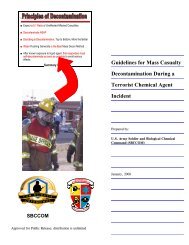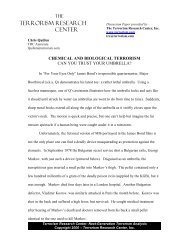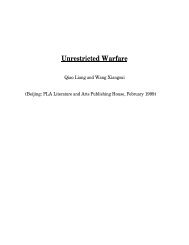Combating Proliferation of Weapons of Mass Destruction
Combating Proliferation of Weapons of Mass Destruction
Combating Proliferation of Weapons of Mass Destruction
You also want an ePaper? Increase the reach of your titles
YUMPU automatically turns print PDFs into web optimized ePapers that Google loves.
could be used as carrots or sticks as part <strong>of</strong> an overall strategy to combat proliferation.Given the increasing tendency to turn to economic sanctions rather than military action inresponse to proliferation activity, it is essential that we begin to treat this “economicwarfare” with the same level <strong>of</strong> sophistication and planning we devote to military options.For example, just as good intelligence is essential to successful military action, so too isgood intelligence on key points <strong>of</strong> leverage in the government <strong>of</strong> a proliferating countryessential for tailoring economic tools to achieve maximum influence.In addition, we should ensure that we have in place the legal mechanisms required toexercise this leverage. For example, the Commission is concerned that known proliferatorsmay be raising funds in U.S. capital markets. The Cox Committee’s recently releasedreport found that “the [People’s Republic <strong>of</strong> China] is using capital markets both as asource <strong>of</strong> central government funding for military and commercial development and as ameans <strong>of</strong> cloaking U.S. technology acquisition efforts by its front companies with a patina<strong>of</strong> regularity and respectability.” 16 Because there is currently no national security-basedreview <strong>of</strong> entities seeking to gain access to our capital markets, investors are unlikely toknow that they may be assisting in the proliferation <strong>of</strong> weapons <strong>of</strong> mass destruction byproviding funds to known proliferators. Aside from the moral implications, there arepotential financial consequences <strong>of</strong> proliferation activity—such as the possible imposition<strong>of</strong> trade and financial sanctions—which could negatively impact investors.Recommendation 5.25: The Secretary <strong>of</strong> the Treasury, in consultation with theNational Director for <strong>Combating</strong> <strong>Proliferation</strong>, should lead an interagency review <strong>of</strong>current mechanisms for exercising financial or economic leverage to combatproliferation, and develop recommendations for improving our use <strong>of</strong> suchleverage, including any legal changes that might be required. This review shouldfocus on positive as well as negative incentives.As part <strong>of</strong> this assessment, the National Director should, in consultation with theappropriate agencies and experts from the private sector, assess options for denyingproliferators access to U.S. capital markets. Options considered should include ways toenhance transparency, such as requiring more detailed reporting on the individuals orcompanies seeking access or disclosure <strong>of</strong> proliferation-related activity, as well asmechanisms to bar entry <strong>of</strong> such entities into the U.S. capital markets. Along with thepossible costs and benefits <strong>of</strong> various options, this review should consider the potentialeffectiveness <strong>of</strong> unilateral actions and the impact <strong>of</strong> those options on the health andviability <strong>of</strong> the global capital market in general and U.S. capital markets in particular.16Report <strong>of</strong> the Committee on U.S. National Security and Military/Commercial Concerns with thePeople’s Republic <strong>of</strong> China, Volume 1, Chapter 1, page 57.78







